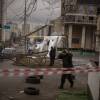More than 4,000 miles from the war raging in Ukraine, 17-year-old Stacy Francois sits in the dining room of her home in Boston’s Hyde Park neighborhood speaking on Zoom with Danylo, whose last name is being withheld, a young man in Ukraine. For months, the Boston Latin Academy student has been helping 19-year-old Danylo work on his conversational English.
But now her question “What did you do today?” evokes a jarring answer. Danylo’s been working with other volunteers to thwart Russian online propaganda.
“We just attacked some Russian propaganda news, so people cannot access that false information about what’s happening in Ukraine,” Danylo said, “And also we just make fire bombs, and what do you just call this, Molotov cocktail?”
More Local News
The tutor is getting some eye opening lessons. Danylo tells Francois he’d long thought his country might be drawn into war and that he might have to carry a gun “but now it’s reality.”
“I can’t imagine my friends and I going together and creating Molotov cocktails,” said Francois, “I could never think of that type of thing happening.”
Their sessions are now practice with the vocabulary of war. And while many young people may know only what they see online about war in Ukraine, for Francois, the English lessons have become a personal window into the trauma of conflict.
Francois chose to tutor early in the pandemic when she was looking for a volunteer opportunity. She signed up with the non profit organization ENGin, which connects Ukrainian students with their peers around the world. Volunteers don’t need to speak Ukrainian or Russian, and for Francois, helping someone with English seemed a natural fit.
“Growing up in a Haitian household, it’s completely normal for the people in your household not to speak English. So it was very common for me to almost translate or help the people in the household learn English,” she said.
But lately, most of ENGin’s students have suspended their lessons because they’re “mostly traumatized and busy surviving,” according to Katerina Manoff, founder of ENGin. Manoff said they currently have over 4,500 students in Ukraine from different regions of the country. There are currently 120 ENGin volunteers in Massachusetts, ranging from 14 to 25 years old.
“The team is mostly not able to work but we’re encouraging volunteers to keep in touch with students and offer moral support,” Manoff said.
Watch: A window into war's trauma through English lessons
Danylo, is a 19-year-old medical student whose classes are suspended. He lives near Kyiv with his family and said he’d like to join the fight against Russia but for now there aren’t enough weapons: Instead, he occupies his time organizing with volunteers through the messaging app Telegram to coordinate food deliveries, and make camouflage nets and improvised weapons.
During their conversation over Zoom, Francois said to Danylo: “It’s crazy thinking about the situation and the differences between the experiences that we’re having.”
He replied: “And it’s really scaring [sic] to be honest because I didn’t know what’s going to happen tomorrow…So I really appreciate your support.”
Francois said she emails every few days to check on Danylo and the two have become “more friends and companions” than teacher and student.
Their conversation ended past midnight Ukraine time. Danylo signed off with a wry laugh saying he needs to go to sleep because there’s “not much sleep” in the bomb shelter.
“So I hope to see you next time, hope I will survive this night,” Danylo said, pausing, “But we will win. We have like no other, no other option. Only to win. So see you.”








